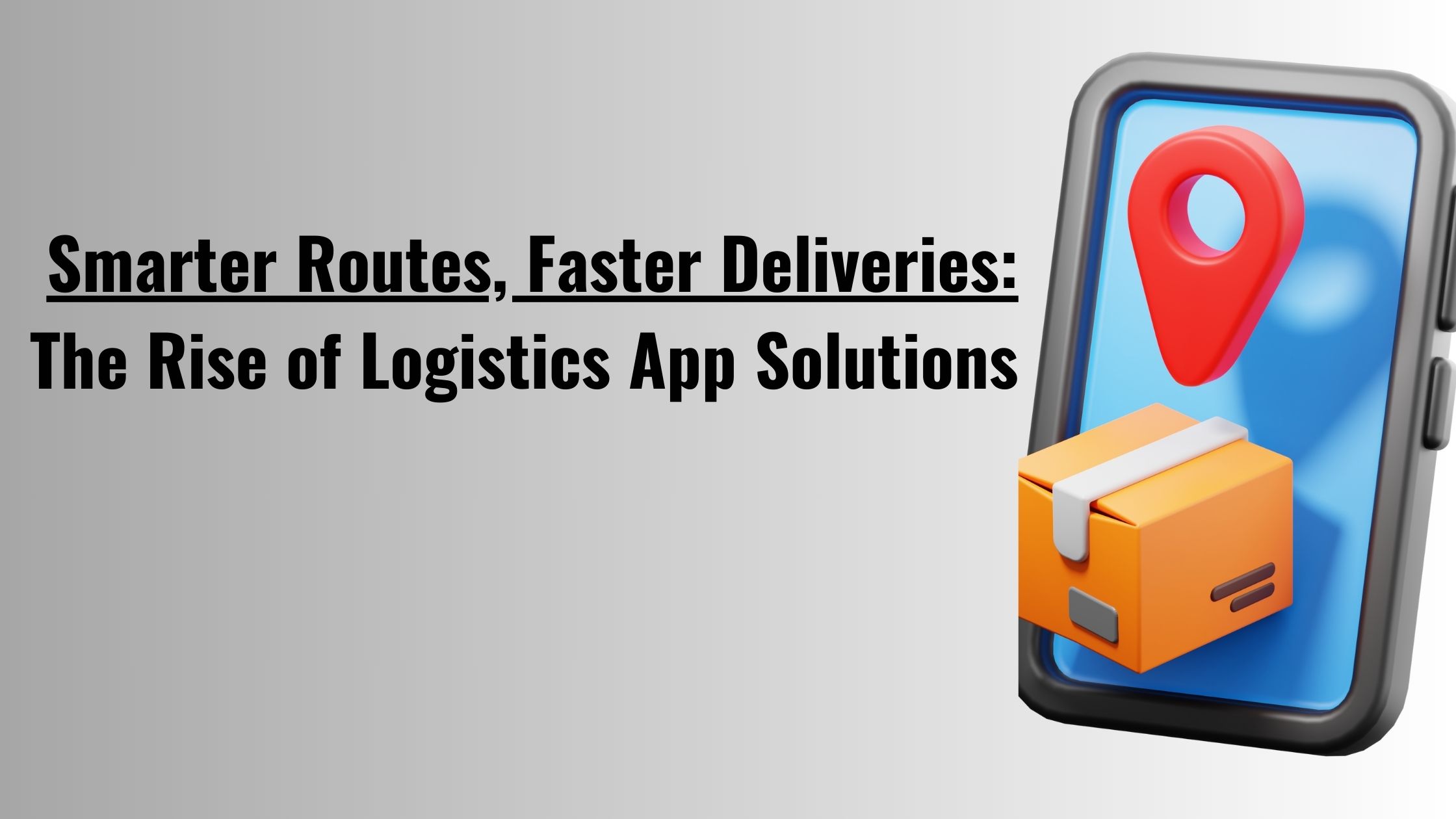Smarter Routes, Faster Deliveries: The Rise of Logistics App Solutions
The logistics industry is a complex beast, constantly evolving to meet the demands of a rapidly changing marketplace. From supply chain disruptions to last-mile delivery challenges, companies are often caught in a web of inefficiencies that can hinder their growth. As consumers expect faster and more reliable service, businesses find themselves under increasing pressure to adapt. Enter logistics app solutions—an innovative approach designed to tackle these common issues head-on. With mobile technology at its forefront, these applications have revolutionized how goods are transported and delivered. They not only optimize routes but also enhance communication between shippers and carriers.
As we delve deeper into this dynamic landscape, let’s explore how logistics mobile app development is transforming the industry for the better.
The Rise of Logistics App Solutions in Addressing Common Issues
The logistics industry has long grappled with various challenges, from inefficient routing to lack of real-time tracking. Traditional methods often fall short in addressing these issues effectively.
Enter logistics app solutions—a game changer for businesses seeking efficiency and transparency. These innovative tools streamline operations by integrating advanced technologies like GPS and AI.
With user-friendly interfaces, logistics apps empower companies to optimize routes dynamically. This reduces fuel costs and enhances delivery speed.
Real-time data analytics provide insights into supply chain performance, helping businesses make informed decisions quickly. The ability to track shipments at every stage fosters trust between companies and their clients.
As more organizations recognize the advantages of this technology, the demand for reliable logistics mobile app development continues to rise. Companies are now prioritizing digital solutions that facilitate a smoother flow of goods from point A to B.
Benefits of Using Logistics Apps for Businesses
Logistics apps have transformed how businesses operate. They streamline processes, making them more efficient and cost-effective. By automating tasks like route planning and inventory management, these apps save time.
Real-time tracking is a game changer. Companies can monitor shipments at every stage, reducing uncertainty for both the business and its customers. This transparency builds trust.
Data analytics features in logistics apps offer valuable insights. Businesses can identify trends, optimize routes, and predict demand more accurately. Such data-driven decisions lead to better resource allocation.
Customer satisfaction improves as well. With timely deliveries and updates, clients feel valued and informed throughout the shipping process.
Moreover, these solutions enhance communication among teams. Instant messaging features allow for quick problem resolution without delays or confusion.
Integrating logistics mobile app development into daily operations not only boosts efficiency but also positions companies ahead of their competitors in an ever-evolving market.
Top Logistics Apps Available in The Market
When exploring logistics app solutions, several standout options cater to diverse business needs.
One popular choice is **Fleet Complete**, which offers real-time tracking and fleet management features. It helps businesses optimize routes and enhance their delivery efficiency.
Another noteworthy app is **Onfleet**. This platform shines with its user-friendly interface and powerful analytics tools that assist companies in managing deliveries seamlessly.
For those looking for an all-in-one solution, **ShipStation** integrates with multiple e-commerce platforms. It simplifies order processing while providing robust shipping options tailored to individual requirements.
Lastly, **Locus** leverages advanced algorithms for route optimization and predictive analytics. Businesses using Locus can achieve significant cost reductions while improving service levels.
These apps not only streamline operations but also empower companies to adapt quickly in a fast-paced logistics landscape.
Trends and Innovations in The Logistics App Industry
The logistics app industry is experiencing rapid evolution. Artificial intelligence and machine learning are becoming integral for optimizing routes in real-time. This innovation allows businesses to reduce delivery times and minimize fuel costs.
Blockchain technology is also gaining traction, enhancing transparency within supply chains. It enables secure transactions and improves trust among stakeholders by providing a tamper-proof record of every shipment.
Another exciting trend is the integration of IoT devices. Smart sensors track inventory levels, monitor vehicle conditions, and provide updates on shipment statuses instantly. These insights help companies make informed decisions promptly.
Moreover, user-friendly interfaces are evolving with customer needs in mind. Enhanced features improve usability for both drivers and dispatchers, leading to better communication across teams.
As these trends unfold, they promise a more connected and efficient logistics landscape that prioritizes speed without sacrificing quality or reliability.
Challenges and Limitations of Using Logistics Apps
While logistics apps offer numerous advantages, they come with their own set of challenges. One significant hurdle is the need for a stable internet connection. In areas with poor connectivity, relying on these applications can lead to delays and inefficiencies.
Additionally, many businesses face integration issues. Aligning existing systems with new app solutions can be complex and time-consuming. This often requires additional resources or specialized IT support.
User training is another concern. Employees must adapt to new technology quickly; otherwise, productivity may suffer during the transition period. Resistance to change among staff members can further complicate implementation.
Data security remains a pressing issue in logistics mobile app development. Protecting sensitive information from cyber threats necessitates robust security measures that some companies might overlook amid rapid deployment efforts.
Future Prospects for The Growth of Logistics App Solutions
The future of logistics app solutions looks incredibly promising. With the rise of e-commerce, demand for efficient delivery systems is skyrocketing. Companies are increasingly turning to technology to meet customer expectations.
Artificial intelligence and machine learning will play significant roles in this evolution. These technologies can analyze vast amounts of data, enabling more accurate forecasting and route optimization.
Furthermore, the integration of IoT devices is set to enhance real-time tracking capabilities. This allows both businesses and customers to stay informed about shipment status at all times.
Sustainability is another driving force behind innovation in logistics apps. As environmental concerns grow, companies are seeking greener solutions that optimize delivery routes and reduce carbon footprints.
Investment in logistics mobile app development will likely continue its upward trajectory. The sector’s adaptability ensures it remains a vital part of modern supply chain strategies as new challenges arise.
Conclusion: Embracing Technology for Efficient and Streamlined
The logistics industry is undergoing a revolutionary change, driven by the rapid advancement of technology. Logistics mobile app development has emerged as an essential tool for businesses looking to enhance their operational efficiency and streamline processes.
As companies face ongoing challenges such as rising costs, increasing customer demands, and supply chain disruptions, logistics apps provide innovative solutions that can address these issues head-on. With real-time tracking, route optimization, and seamless communication features, businesses are finding it easier than ever to manage deliveries effectively.
The benefits are clear: improved delivery times lead to higher customer satisfaction rates while reducing operational costs. Companies utilizing top-tier logistics applications have shown marked improvements in both productivity and profitability. Success stories abound from various sectors—whether it’s a small business optimizing its deliveries or large corporations enhancing their distribution networks with sophisticated tech tools.
However, the journey isn’t without its hurdles. Challenges related to data security and integration with existing systems can pose risks for some organizations venturing into this digital transformation. It’s crucial for companies to navigate these pitfalls carefully while also staying abreast of evolving trends in the logistics app landscape.
Looking ahead, the growth potential for logistics app solutions seems boundless. As more firms recognize the value of embracing technological innovations like artificial intelligence and machine learning within their operations, we can expect even smarter routes leading to faster deliveries across industries.
By adopting cutting-edge strategies in logistics mobile app development today, businesses position themselves at the forefront of tomorrow’s marketplace—a place where efficiency reigns supreme and streamlined processes pave the way for enduring success.




